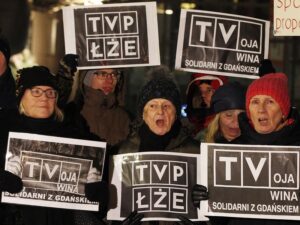propoganda
Global Media Control
January 4, 2021
Front pages of main polish newspapers are pictured one day after the first round of the presidential election in Poland on June 29, 2020. – Poland’s right-wing President Andrzej Duda topped round one of a presidential election on Sunday, triggering a tight run-off with Warsaw’s liberal Mayor Rafal Trzaskowski on July 12, according to an Ipsos exit poll. (Photo by JANEK SKARZYNSKI / AFP) (Photo by JANEK SKARZYNSKI/AFP via Getty Images)
NPR
‘Journalist Mariusz Kowalewski noticed something was amiss when his editors came to him with a new assignment: follow an outspoken critic of Poland’s ruling party with a drone.
“The idea was to send this drone over to his house in order for him to notice it and to feel threatened, like he was being watched,” Kowalewski recalls. “This was an intimidation method straight out of communism.”
The order came from his editors at TVP, Poland’s largest broadcaster which oversees a vast network of public television and radio stations.
Kowalewski says he sabotaged the plan by giving the drone operator an outdated address, but he says the episode taught him public television is no longer serving the public. Instead, he says, it’s serving Poland’s governing right-wing populist party, Law and Justice. “Instead of information, viewers now get blunt propaganda that is meant to assure them that Law and Justice is the best party to rule this country,” he says.
The party believes it is fighting an infiltration of liberal European values, spread through foreign-owned media, in this largely conservative Catholic country. Since Poles first voted Law and Justice into office in 2015, its government has not only taken control of the country’s largest public broadcaster, but it has also vowed to “re-Polanize” the national media. Critics say this is code for turning them into government propaganda outlets. The government’s moves to control the country’s media have become a political flashpoint in this European Union member state, which the EU is investigating along with other various rollbacks of democratic norms in Poland since Law and Justice took office.’
TVP is taxpayer funded and previously was editorially independent. But in 2015, Law and Justice began passing legislation that led to a purge of the public broadcaster’s editorial leadership and replaced them with party loyalists. It also put TVP under the supervision of a new National Media Council.

Protesters hold signs demanding the resignation of TVP chairman Jacek Kurski in Warsaw, Poland, Saturday, Jan. 26, 2019, blaming the atmosphere created by the government-controlled television’s “hate speech” for the recent stabbing and murder of Gdansk Mayor Pawel Adamowicz. (AP Photo/Czarek Sokolowski)
Protester chants echoe through the empty city streets of Warsaw: “TVP Lies! TVP Lies!”
The news was propaganda then — and it’s returned to propaganda now, says protest organizer Karol Grabski. “We’ve come here every day since the death of Mayor Adamowicz, who was murdered in Gdansk,” he says.
Gdansk Mayor Pawel Adamowicz — a liberal critic of Law and Justice — was stabbed to death while he was on stage at a charity event in January 2019. Adamowicz had been a target of dozens of TVP news stories criticizing him for real estate dealings, his openness to migrants and his support of LGBT rights. Critics blame the network for creating an atmosphere that led to his murder.
Full piece: https://www.npr.org/2021/01/04/951063118/polands-government-tightens-its-control-over-media
Hannah Arendt
July 28, 2018“She wrote in her 1951 Origins of Totalitarianism, going on to elaborate that this “mixture of gullibility and cynicism… is prevalent in all ranks of totalitarian movements”:
In an ever-changing, incomprehensible world the masses had reached the point where they would, at the same time, believe everything and nothing, think that everything was possible and nothing was true… The totalitarian mass leaders based their propaganda on the correct psychological assumption that, under such conditions, one could make people believe the most fantastic statements one day, and trust that if the next day they were given irrefutable proof of their falsehood, they would take refuge in cynicism; instead of deserting the leaders who had lied to them, they would protest that they had known all along that the statement was a lie and would admire the leaders for their superior tactical cleverness.
“The great analysts of truth and language in politics”—writes McGill University political philosophy professor Jacob T. Levy—including “George Orwell, Hannah Arendt, Vaclav Havel—can help us recognize this kind of lie for what it is…. Saying something obviously untrue, and making your subordinates repeat it with a straight face in their own voice, is a particularly startling display of power over them. It’s something that was endemic to totalitarianism.”
Arendt and others recognized, writes Levy, that “being made to repeat an obvious lie makes it clear that you’re powerless.” She also recognized the function of an avalanche of lies to render a populace powerless to resist, the phenomenon we now refer to as “gaslighting”:
The result of a consistent and total substitution of lies for factual truth is not that the lie will now be accepted as truth and truth be defamed as a lie, but that the sense by which we take our bearings in the real world—and the category of truth versus falsehood is among the mental means to this end—is being destroyed.
Arendt’s analysis of propaganda and the function of lies seems particularly relevant at this moment. The kinds of blatant lies she wrote of might become so commonplace as to become banal. We might begin to think they are an irrelevant sideshow. This, she suggests, would be a mistake.
Open Culture, Michiko Kakutani

